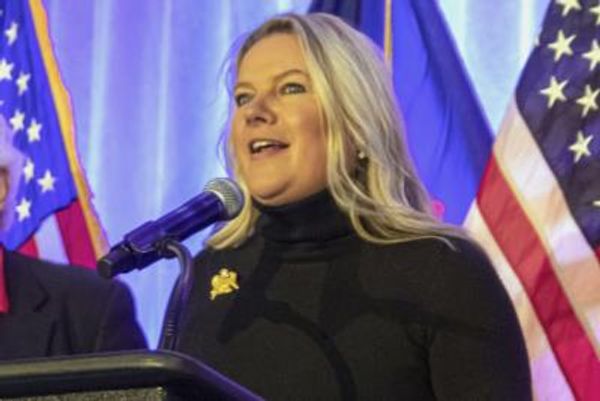In her 20 years working at the local high school, Lee Woolley says she has never seen so many families struggling with the cost of living.
"We have a free breakfast program and over the last six, seven years that I've been doing it, I've noticed more and more children are coming … than ever before, and to me that's a big warning sign that this situation that everyone's in is going to get worse."
Ms Woolley has lived in the Huon Valley, south of Hobart, all her life.
"Everyone's struggling. I'm nearly 70 and I've still got to work part-time," she said.
She collected a bag of food from a new support service that is visiting Huonville once a week.
Ms Woolley said the food was for her daughter, who has two small children of her own.
"She's noticed in the last, say, four weeks to five weeks that her grocery bill's gone up nearly $150," Ms Woolley said.
Last week the food van — a service provided by Hobart City Mission in collaboration with not-for-profit aged and disability care provider the Italian Day Centre and the Kingborough Lions club — made its first trip to Huonville.
It helped about four people, but this week about 20 came for help.
"Once the word gets out, they'll be lined up around the corner," Ms Woolley said.
Service a chance to test the waters in regional areas
The van, which also visits Sorell, is stocked with frozen meals and packaged food. Volunteers are also able to heat up food for people, and make them a hot drink.
Italian Day Centre manager Stefano Lufi said his organisation suggested the program after noticing more people approaching its workers in rural communities.
"They used to ask for money. Those days are gone — now they ask for food," Mr Lufi said.
"We don't want to see people going hungry, especially children."
Hobart City Mission has also noticed more people coming to its Hobart office for help and, anecdotally, it is hearing of increasing need in regional areas.
The charity's housing services program manager Ewan Higgs said the new food van service was a chance to "test the water" in the regions.
"We really need to get out and into those communities more and talk to the people who are around, talk to some of the support services," Mr Higgs said.
With most charities' operations centred in cities, the level of need in regional Tasmania is not as well known.
One indicator of households' financial position is rental affordability. A household that spends more than 30 per cent of its income on rent is said to be in "rental stress".
According to Census figures, 40 per cent of renting households in the Sorell Council area are in rental stress, and in the Huon Valley that figure is 37 per cent.
It compares with 33 per cent in Hobart.
Huon Valley Mayor Sally Doyle said charities and op shops in her community were noticing an increase in demand.
"Some families that don't usually shop at op shops (are) coming in and getting presents for Christmas and clothes for the the kids," Ms Doyle said.
"One of the number one (cost pressures) for people that are working is fuel. That's creating huge pressures for low income families just to get to work."
Some people 'reluctant to ask for help'
Helen Pollard is chief executive of South Eastern Community Care, a not-for-profit aged care and disability service provider in Sorell.
Ms Pollard said the organisation was hearing from some of its clients and others in the community that they are struggling to make ends meet.
When Hobart City Mission asked if it could park the food van outside SEC Care's office in Sorell, Ms Pollard said the organisation was pleased to be able to help.
"I'm really hoping that it will give people the opportunity to ask for help and get help if they need it, get some information on the kind of services that they may be able to get and also help organisations like City Mission be able find the actual need … We're seeing an increase in people asking for help," she said.
"I think there's still an element of people that are reluctant to ask for help."
Ms Pollard said she hoped the new service, which is offered in partnership with local organisations, would encourage people who might be struggling but who are also reluctant to ask for help "just make that first little step and have a cup of coffee with volunteers that are locals".
"People will be able to come and have something in a space that's safe, that is not too overwhelming for them, and then that may lead to more options and more ability for them to ask for help."
The van is starting as a six month trial, visiting Huonville on Tuesday afternoons and Sorell on Thursday afternoons. If demand is there, the service could be expanded to other regional communities.







